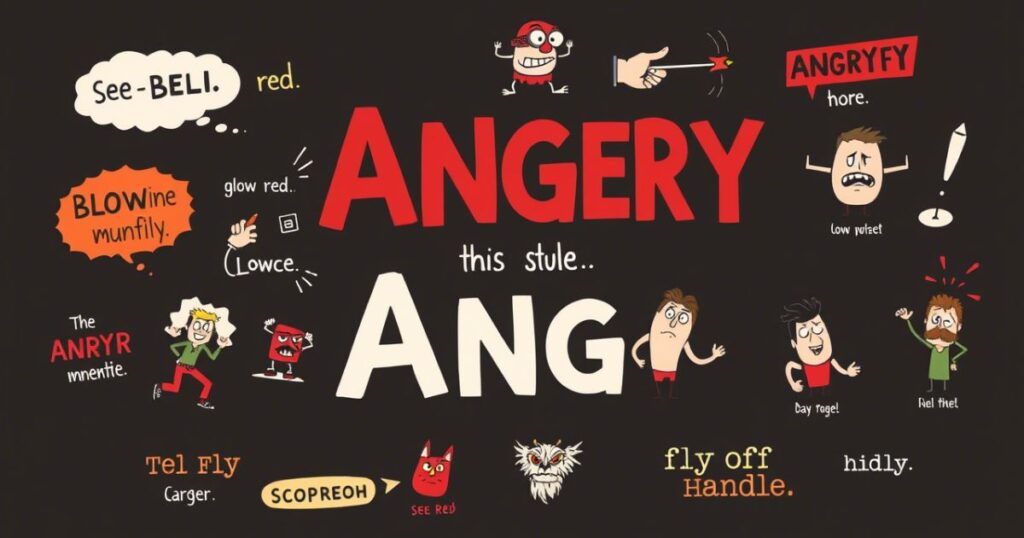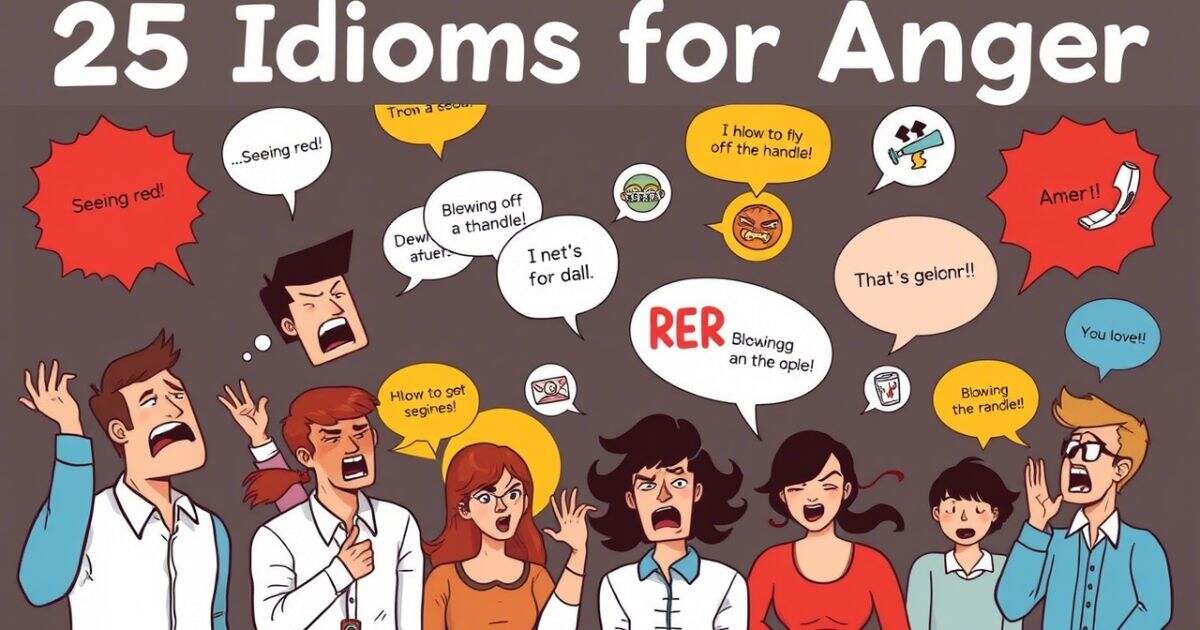Anger is a strong emotion, and people use many idioms for anger to describe it. These phrases make conversations more colorful and expressive. Instead of saying “I was very angry,” you can say, “I was seeing red” or “I blew a fuse.” These anger idioms help paint a clear picture of frustration and rage. Learning idioms for angry feelings can make your English sound more natural and fun.
There are many idioms about anger that describe different levels of frustration. Some show mild irritation, like “hot under the collar.” Others express extreme rage, like “go ballistic.” These phrases are common in daily conversations, books, and movies. Knowing idioms for anger can help you understand people better and express emotions more clearly. Whether you’re “jumping down someone’s throat” or “blowing a gasket,” these expressions bring language to life. Mastering anger idioms will improve your communication skills.
Idioms for Anger

Idioms for Anger help describe frustration and rage in a vivid way. Expressions like “seeing red” or “blow a fuse” show strong emotions. These phrases make conversations more colorful and engaging.
Many idioms for anger describe sudden outbursts, like “fly off the handle” or “hit the roof.” Others, such as “hot under the collar,” show irritation. Using these phrases makes speech and writing more expressive, helping people understand emotions better.
1. Seeing Red
Instant Anger: Describes sudden, intense rage and frustration, often leading to explosive anger and furious reactions.
Loss of Control: Someone “seeing red” may fly off the handle, blow a gasket, or have an emotional outburst without thinking.
Common Usage: Used when someone is pissed off, hot under the collar, or on the warpath, reacting aggressively.
2. Blowing a Fuse
- Refers to sudden temper loss leading to explosive anger and furious reactions.
- Often triggered by extreme irritation and annoyance, causing someone to go ballistic.
- Can result in spitting nails or riled-up confrontations.
3. Jumping Down Someone’s Throat
- Describes a strong emotional reaction, often snapping at someone in a fury.
- Happens when someone is boiling with anger and loses patience.
- Similar to biting someone’s head off due to intense frustration.
4. Hit the Roof
- Means someone flies off the handle due to rage and frustration.
- Often occurs when an unexpected event causes steaming mad anger.
- Can lead to outbursts of rage and temper flare-ups.
5. Hot Under the Collar
- Indicates growing irritation and annoyance, leading to seeing smoke.
- Can be a warning sign before someone blows a gasket.
- Often used when someone is pissed off but trying to contain their strong emotions.
6. On the Warpath
- Implies someone is extremely riled up, ready for confrontation.
- Used when someone is fit to be tied and seeking revenge or justice.
- Often leads to furious idioms being expressed in a heated exchange.
7. Steam Coming Out of Ears
- A visual metaphor for boiling with anger and fuming with rage.
- Represents seeing red before a person blows a fuse.
- Often linked to enraged expressions and losing control.
8. Fit to Be Tied
- Describes someone at their breaking point, ready to go ballistic.
- Used when someone loses their cool due to intense frustration.
- Indicates explosive anger about to erupt.
9. Wrath of God
- Refers to overwhelming rage, as if divine punishment is coming.
- Represents anger metaphors taken to an extreme level.
- Can be used to describe seeing smoke and acting with righteous fury.
10. Have a Chip on One’s Shoulder
- Means someone is constantly riled up, looking for a fight.
- Often leads to temper flare-ups and biting someone’s head off.
- Suggests long-standing resentment, causing frequent furious reactions.
11. Bite Someone’s Head Off
- Means snapping at someone harshly due to anger or frustration.
- Often a result of stress, irritation, or sudden temper loss.
- Similar to jumping down someone’s throat, reacting aggressively.
- People who bite heads off may regret it later.
- Can indicate having a short fuse or being riled up.
12. Like a Bull in a China Shop
- Refers to reckless, clumsy, or destructive behavior, often out of anger.
- Someone in rage and frustration may act without thinking.
- Can lead to furious reactions and explosive anger.
- Similar to going ballistic, losing control completely.
- Often used for people who don’t realize the impact of their actions.
13. Have a Short Fuse
- Describes someone who gets angry very quickly.
- Often leads to temper flare-ups and sudden outbursts of rage.
- Similar to blowing a fuse or fuming with rage.
- People with a short fuse struggle to control strong emotions.
- May react furiously over small annoyances.
Related Guide:
14. Fly off the Handle
- Means losing control in a fit of rage.
- Often happens when someone is pushed to their limit.
- Similar to blowing a gasket or going ballistic.
- A person who flies off the handle may act irrationally.
- Common in moments of intense frustration.
15. Steaming Mad

- Describes someone fuming with rage and barely containing anger.
- Often leads to furious reactions and explosive anger.
- Similar to seeing red or having steam coming out of ears.
- Can be the result of strong emotions building up.
- Sometimes, people bite someone’s head off when they’re this mad.
16. Blow a Gasket
- Means losing one’s cool completely.
- A person who blows a gasket reacts with extreme fury.
- Similar to blowing a fuse or going ballistic.
- Often caused by intense frustration or sudden temper loss.
- Can result in emotional outbursts and even shouting or yelling.
17. Go Ballistic
- Describes someone completely losing control due to anger.
- Often leads to explosive anger and furious reactions.
- Similar to flying off the handle or spitting nails.
- Can be triggered by severe irritation or frustration.
- People jump down others’ throats when they go ballistic.
18. Spit Nails
- Means being extremely angry and ready to explode.
- Similar to seeing red or being steaming mad.
- A person spitting nails is often on the warpath.
- Anger at this level is hard to contain.
- Can result in biting someone’s head off or blowing a gasket.
19. In a Fury
- Describes someone in a state of uncontrollable rage.
- Similar to wrath of God, showing intense frustration.
- A furious person may lose their temper instantly.
- Can lead to boiling with anger and furious idioms in speech.
- Often paired with actions like slamming doors or shouting.
20. Seeing Smoke
- Means someone is so angry they’re almost steaming.
- Similar to steam coming out of ears and fuming with rage.
- A person seeing smoke is at their breaking point.
- Can result in blowing a fuse or going ballistic.
- This level of anger is often hard to calm down.
21. Riled Up
- Describes someone feeling agitated and irritated, on the verge of losing their temper.
- Can result from constant annoyance or being provoked.
- Often leads to furious reactions and explosive anger.
- Similar to boiling with anger, where emotions become uncontrollable.
- Someone riled up may have steam coming out of their ears.
22. Up in Arms
- Means a group of people are angry and ready to protest or fight.
- Often used when people strongly oppose something unfair.
- Represents rage and frustration turning into collective outrage.
- Similar to being on the warpath, where anger fuels action.
- Can escalate quickly, leading to heated confrontations.
23. Have a Bone to Pick
- Refers to having an unresolved issue that makes someone irritated and annoyed.
- Often leads to heated arguments or emotional outbursts.
- Represents strong emotions about a past offense.
- Similar to jumping down someone’s throat, when anger erupts suddenly.
- Can be minor frustration or boiling with anger depending on the situation.
24. Pissed Off
- A common way to say someone is angry, frustrated, or annoyed.
- Can range from mild irritation to explosive anger.
- Similar to losing one’s cool or feeling fit to be tied.
- Often leads to blowing a gasket or going ballistic.
- A person who’s pissed off may be seeing red or fuming with rage.
25. Up in Smoke

- Describes anger and frustration when plans or efforts fail suddenly.
- Often used when something important is ruined beyond repair.
- Can lead to strong emotional reactions, including outbursts of rage.
- Similar to blowing a fuse, when emotions overwhelm someone.
- The phrase also symbolizes disappointment mixed with intense anger.
Exercise to Practice
- When my friend borrowed my car and returned it with a huge scratch, I was ________.
- My boss ________ when I arrived late for the third time this week.
- The coach ________ when the team lost an easy game due to careless mistakes.
- Dad ________ when he found out I had been skipping school.
- I could tell he was ________ when he clenched his fists and gritted his teeth.
- Watch out! The teacher’s ________ because nobody submitted their assignments on time.
- When I got blamed for something I didn’t do, I felt like ________.
- My neighbor was ________ when our dog dug up her garden.
- The customer’s ________ was obvious when he started shouting at the cashier.
- Ever since losing the promotion, Mark has ________.
Answers:
- Steaming mad
- Blew a gasket
- Went ballistic
- Flew off the handle
- Seeing smoke
- Up in arms
- Spit nails
- Riled up
- Boiling with anger
- Had a bone to pick
FAQ’s
What is the idiom of angry?
Many idioms for anger describe strong emotions, like “seeing red” or “hot under the collar.” These phrases make speech more expressive and vivid.
What is the idiom of in anger?
Some idioms for anger show sudden outbursts, such as “fly off the handle” or “blow a fuse.” They describe losing control due to frustration.
How do idioms for anger make language better?
Using idioms for anger makes speech lively and colorful. Instead of saying “I’m mad,” phrases like “hit the roof” create a stronger impact.
Are idioms for anger used in daily life?
Yes, people use idioms for anger often. You might hear “steam coming out of ears” or “go ballistic” when someone is extremely frustrated.
idioms for anger be used in writing?
Absolutely! Writers use idioms for anger to show emotions clearly. Phrases like “bite someone’s head off” help readers feel the intensity of anger.
Conclusion
Idioms for anger make conversations more interesting and expressive. Instead of simply saying someone is angry, you can use angry idioms like “blow a gasket” or “fly off the handle.” These phrases add color to language and help describe emotions in a powerful way. Whether it’s mild irritation or extreme rage, there are many idioms for angry feelings to choose from. Learning these expressions will make your speech and writing more engaging.
Understanding idioms about anger also helps you recognize emotions in books, movies, and daily life. When someone says they are “seeing red” or “on the warpath,” you’ll know they are furious. Using anger idioms can make your English sound more natural and fluent. These phrases bring emotions to life in a way that plain words cannot. So, keep practicing idioms for anger and use them to express frustration, annoyance, or rage in a vivid and exciting way!

Ronan Fox is an experienced administrator with five years of expertise in managing operations, streamlining workflows, and ensuring organizational efficiency. He excels in team coordination, process optimization, and problem-solving. His strong leadership and analytical skills drive productivity and success.








